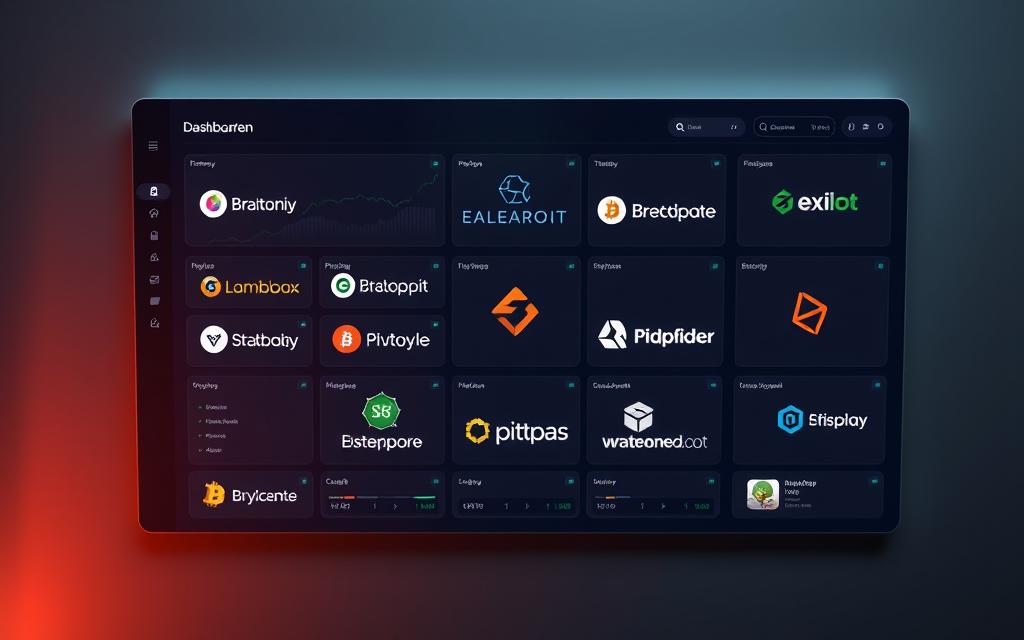Table of Contents
Many investors seek platforms that combine traditional assets with digital currencies. Webull, a well-known brokerage, now provides access to over 60 cryptocurrencies, including Bitcoin and Ethereum. This expansion allows users to diversify their portfolios seamlessly.
The platform operates on a commission-free model, though small spreads apply. Unlike dedicated exchanges, Webull integrates digital assets alongside stocks and ETFs. This hybrid approach simplifies management for casual traders.
However, limitations exist. Instant deposits cap at $1,000, and ACH transfers take four days to clear. For those needing advanced features, alternatives like dedicated crypto exchanges may prove more suitable.
Security remains a priority, with two-factor authentication protecting accounts. As Webull continues evolving, its role in the digital asset space grows clearer for modern investors.
Introduction: Does Webull Have Crypto Trading?
Digital asset trading has become a key feature for modern brokerages. This shift reflects growing demand from investors who want diversified portfolios in one place. Webull answers this need with a hybrid approach, blending traditional and crypto markets seamlessly.
Webull’s Position in the Brokerage Market
Founded in 2017, this commission-free platform now serves over 20 million users. As a regulated brokerage, it operates under SEC/FINRA oversight with Apex Clearing insurance. The integration of stocks, ETFs, and 60+ cryptocurrencies sets it apart.
Webull manages digital assets through Bakkt Crypto Solutions, sourcing liquidity from CCC/Bitfinex. This ensures competitive pricing while maintaining regulatory compliance. The $1 minimum trade lowers barriers for newcomers.
Why Crypto Traders Consider Webull
Mainstream investors benefit from features like Instant Buying Power, bridging gaps between asset classes. The platform’s 24/7 trading availability contrasts with traditional market-hour restrictions.
“Webull’s strength lies in its unified interface—no need to juggle multiple apps for different assets.”
Its mobile and desktop parity ensures on-the-go management. While spreads include a 1% markup, the absence of commissions keeps costs transparent. For those prioritizing simplicity, Webull’s services offer a compelling middle ground.
Webull’s Cryptocurrency Offerings
Modern traders demand access to diverse digital assets, and Webull delivers with an extensive selection. The platform supports over 60 cryptocurrencies, from established giants like Bitcoin (BTC) to trending altcoins such as Shiba Inu (SHIB). This variety caters to both conservative investors and those exploring emerging opportunities.
Supported Cryptocurrencies on Webull
The market coverage includes Ethereum (ETH), Decentralized (MANA), and niche tokens like Karura (KARURA). Notably absent are privacy-focused coins (Monero, Zcash) and volatile memecoins (BONK). Webull’s slower asset additions compared to dedicated exchanges mean newer listings may appear with a delay.
Trading Pairs and Liquidity Providers
All trading occurs via USD pairs—no crypto-to-crypto conversions are available. Liquidity aggregates from partners like Cross-Chain Capital and Bitfinex, ensuring competitive pricing. Users benefit from real-time charts and multiple order types (market, limit, stop), though staking or yield features remain unavailable.
“Corporate custody through Bakkt provides regulatory compliance but limits direct wallet control—a trade-off for security-minded traders.”
While Webull simplifies crypto access, its hybrid model prioritizes integration over advanced features. For traders valuing convenience, this balance may justify the platform’s constraints.
How to Trade Crypto on Webull
Getting started with digital assets on Webull takes just minutes. The platform combines a user-friendly interface with regulatory compliance, ideal for newcomers. Follow these steps to begin trading seamlessly.
Account Setup and Verification
Creating an account requires basic personal details and SSN verification. The 20-minute process includes KYC checks via ID submission. Only individual brokerage accounts are supported—IRAs and trusts cannot hold digital assets.
Two-factor authentication adds security during setup. Desktop and mobile apps mirror functionality, ensuring parity across devices. Note: Options traders face additional restrictions for crypto access.
Funding Your Account and Buying Power
Deposit USD via ACH or wire transfers. Instant Buying Power (IBP) caps at $1,000, with availability depending on Eastern Time cutoffs:
| Deposit Time (ET) | IBP Availability |
|---|---|
| Before 4 PM | Same day |
| After 4 PM | Next business day |
Minimum trades start at $1, but transfers take 4 days to clear. Unlike dedicated exchanges, Webull prohibits inbound/outbound crypto transfers. Tax documents integrate automatically for easier reporting.
“Webull’s hybrid model prioritizes accessibility over advanced features—perfect for investors diversifying into digital assets.”
Understanding Webull’s Buying Power for Crypto
Understanding buying power is crucial for active crypto investors. Webull’s Instant Buying Power (IBP) lets traders execute orders before deposits clear, avoiding missed opportunities. This feature acts as a credit line during the 4-day ACH transfer process.
What Is Instant Buying Power (IBP)?
IBP provides up to $1,000 in provisional funds for trading. Unlike margin accounts, this credit doesn’t require interest payments. Deposits made before 4 PM ET unlock same-day access, while later submissions delay availability.
The $1,000 cap protects against overdrafts and aligns with Webull’s risk management policies. Frequent traders should note: IBP may be revoked arbitrarily if market volatility spikes.
Limitations and Timelines for IBP
Key constraints include:
- No crypto-to-crypto conversions—USD pairs only
- Prohibited for options trading
- Tax implications for unsettled trades
“Webull’s IBP mirrors Robinhood’s instant settlements but with stricter caps—ideal for cautious diversification.”
For a $1,200 deposit, only $1,000 becomes immediately available. The remaining $200 unlocks post-clearance. This staggered account access balances flexibility with financial safeguards.
Webull Crypto Fees and Pricing Structure
Transparent pricing separates competitive brokerages from outdated models. Webull’s platform attracts users with commission-free trading, but understanding the full cost picture requires deeper analysis.
The Reality of Commission-Free Trading
While Webull advertises zero commissions, built-in spreads add 1% to each transaction. A $20,000 Bitcoin purchase effectively costs $20,200—a 2% round-trip expense. This differs from Coinbase’s model combining 1% fees with fixed $0.99 charges per trade.
Key advantages remain:
- No deposit/withdrawal fees for USD transfers
- Automatic tax lot accounting simplifies reporting
- Identical pricing across mobile and desktop services
Spread Impact on Trading Strategies
High-frequency traders face compounded costs from Webull’s spreads. Ten $1,000 trades accumulate $100 in fees—equivalent to traditional broker commissions. Long-term holders experience less impact, making the platform better suited for buy-and-hold approaches.
| Platform | Fee Structure | Best For |
|---|---|---|
| Webull | 1% spread (each way) | Infrequent traders |
| Kraken | 0.16%-0.26% maker fees | Active trading |
“Webull’s simplicity comes at a price—spreads replace commissions but create similar cost burdens for frequent traders.”
Corporate custody eliminates network fees for blockchain transactions. However, the inability to transfer crypto offsets this benefit for users wanting self-custody options.
Security Measures for Crypto on Webull
Asset safety distinguishes trustworthy platforms from risky alternatives. Webull implements multi-layered protections to shield investors from threats like hacking or fraud. These measures blend technology, regulation, and user education.

Regulatory Compliance and Protections
Webull operates under FINRA/SEC oversight, with 128-bit AES encryption securing all data. Its SOC 2 Type II certification confirms rigorous auditing of security practices. Apex Clearing provides $37.5M insurance, though this pales next to Coinbase’s $255M coverage.
Key regulatory safeguards include:
- FDIC insurance on USD balances (up to $250,000)
- Mandatory two-factor authentication (2FA) for logins
- Cold storage via Bakkt for 95% of digital assets
How Webull Safeguards Your Assets
Proactive defenses include biometric logins and address whitelisting for withdrawals. Phishing attempts trigger instant alerts, while hacked accounts freeze pending review. User education resources explain spotting scams.
| Protection Feature | Webull | Coinbase |
|---|---|---|
| Insurance per Account | $37.5M | $255M |
| Cold Storage % | 95% | 98% |
| Biometric Login | Yes | Yes |
“Webull’s hybrid model prioritizes compliance over flexibility—ideal for traders valuing institutional-grade safeguards.”
While direct crypto transfers are restricted, these controls minimize exposure to exchange breaches. For trading within regulated bounds, Webull’s framework balances accessibility with accountability.
Webull Pay: A Dedicated Crypto Solution?
Investors seeking streamlined crypto management now have Webull Pay as an option. This specialized feature set addresses unique needs of digital asset traders while maintaining integration with traditional portfolios.
Features of Webull Pay
The platform offers a separate interface optimized for crypto services. Users enjoy unified balances showing combined stock and digital asset values in one account.
Key capabilities include:
- Recurring investment automation for dollar-cost averaging
- Real-time price alerts and customizable watchlists
- Integrated tax reporting for simplified compliance
Minimum trades start at just $1, lowering barriers for new investors. However, the absence of external wallet transfers limits flexibility for advanced users.
Pros and Cons of Using Webull Pay
This solution excels in convenience but has notable gaps. The table below compares it against Crypto.com’s offering:
| Feature | Webull Pay | Crypto.com App |
|---|---|---|
| NFT Support | No | Yes |
| OTC Trading | No | Yes |
| Educational Content | Limited | Extensive |
Customer support channels remain identical to Webull’s main tools. While lacking DeFi integrations, the automated investment features appeal to passive investors.
“Webull Pay bridges gaps between traditional and digital assets but won’t replace dedicated crypto services for power users.”
For those prioritizing simplicity over advanced functionality, Webull Pay delivers capable crypto services within a familiar ecosystem.
Can You Withdraw Crypto from Webull?
Control over digital assets remains a critical concern for modern investors. Webull’s partnership with Bakkt Crypto Solutions means users never receive private keys—all holdings are custodied institutionally. This “not your keys, not your crypto” model limits direct transfers to external wallets.
Custody and Ownership Limitations
Webull treats digital assets like securities—buyable and sellable, but not withdrawable. Sales convert to USD, triggering taxable events. Third-party custody reduces hacking risks but eliminates self-sovereignty.
Key constraints include:
- No hardware wallet integrations
- Inability to participate in DeFi or staking
- Insurance capped at $37.5M per breach
Alternatives for Self-Custody
For true ownership, consider using Webull as an on-ramp to dedicated exchanges like Coinbase. Compare withdrawal capabilities:
| Feature | Webull | Coinbase |
|---|---|---|
| External Transfers | No | Yes |
| Network Fees | N/A | User-paid |
| Multisig Wallets | No | Yes |
“Hybrid platforms prioritize convenience over control—choose based on your custody preferences.”
Paper wallets or institutional services like Fidelity Crypto offer middle-ground solutions. Always verify tax implications before moving assets between platforms.
Webull Crypto vs. Traditional Exchanges
Investors weighing options between hybrid and specialized platforms face key trade-offs. Webull’s integrated approach serves a distinct niche compared to dedicated crypto exchanges like Binance. Understanding these differences helps traders select the right trading platform for their strategy.
Key Differences in Trading Experience
Webull simplifies portfolio management with a single interface for stocks and digital assets. Unlike Coinbase or Kraken, it lacks crypto-to-crypto pairs—all trades involve USD conversions. Advanced tools like trailing stops exist, but liquidity depth trails specialized platforms.
Critical contrasts include:
- Margin trading: Available for stocks but not cryptocurrencies
- Tax reporting: Automated forms for both asset classes
- API access: Limited compared to Binance’s developer resources
When to Choose Webull Over Dedicated Exchanges
This trading platform excels for investors who value consolidation. Those holding mixed portfolios benefit from unified tracking and reporting. The table below highlights ideal use cases:
| Scenario | Webull | Traditional Exchange |
|---|---|---|
| Diversified holdings | Optimal | Separate accounts needed |
| Frequent altcoin trading | Limited selection | Better suited |
| DeFi participation | Not supported | Required |
“Hybrid platforms reduce app-switching fatigue but sacrifice niche features—choose based on your core investment activities.”
Referral programs also differ significantly. Webull offers stock bonuses, while crypto exchanges typically reward users with token incentives. This reflects each platform’s underlying focus and revenue models.
Top Alternatives to Webull for Crypto Trading
Diverse platforms cater to different crypto trading needs and strategies. While hybrid brokerages simplify portfolio management, dedicated crypto exchanges offer advanced features and broader asset selections. Evaluating these alternatives helps traders optimize their approach.

Binance: The Industry Leader
With 350+ supported coins, Binance dominates the trading platforms space. Its 0.1% spot trading fees undercut most competitors, while BNB token holders receive additional discounts.
Key advantages include:
- Futures trading with 125x leverage
- Earn programs offering 10%+ APY on staking
- Integrated fiat on-ramps in 50+ countries
“Binance’s liquidity depth makes it ideal for large-volume traders—order books rarely show significant slippage.”
Kraken: Advanced Trading Tools
Professional traders favor Kraken for its institutional-grade tools. The Pro version includes dark pool access and an OTC desk for block trades exceeding $100,000.
Notable services:
- Margin trading at 5x leverage
- 24/7 phone support for VIP clients
- Regulated status in 48 US states
KuCoin: Privacy-Focused Trading
This platform allows anonymous trading for transactions under 1 BTC. KuCoin’s futures market supports 100x leverage, appealing to risk-tolerant investors.
Distinctive characteristics:
- KCS token provides fee discounts and profit-sharing
- No mandatory KYC for basic account tiers
- 500+ trading pairs including niche altcoins
| Platform | Best For | Security History |
|---|---|---|
| Binance | Liquidity & Variety | 2022 $570M hack (reimbursed) |
| Kraken | Institutional Traders | Zero breaches since 2013 |
| KuCoin | Anonymity Seekers | 2020 $281M incident |
Pros of Trading Crypto on Webull
Streamlined portfolio management sets Webull apart in the crowded brokerage space. The platform combines traditional and digital assets in one interface, eliminating the need for multiple apps. This integration benefits investors seeking simplicity without sacrificing functionality.
User-Friendly Interface
Webull’s design prioritizes accessibility for all experience levels. Paper trading allows risk-free practice with $1M virtual funds—ideal for testing strategies. Key tools include:
- Customizable watchlists with price alerts
- Social sentiment indicators tracking crowd behavior
- Benzinga news integration for real-time updates
The demo account mirrors live trading conditions, helping users familiarize themselves before committing capital.
Integration with Traditional Investments
This hybrid approach enables unified tracking of 401(k), IRA, and crypto holdings. Tax-loss harvesting automates write-offs across asset classes. Comparative advantages include:
| Feature | Webull | Traditional Brokers |
|---|---|---|
| Dividend Reinvestment | Auto-apply to crypto/stocks | Stocks only |
| Pattern Day Trader Protection | Applies to all assets | Equities-focused |
| Robo-Advisor Compatibility | Full integration | Limited support |
“Webull’s institutional research paired with retail-friendly services creates a unique value proposition for hybrid investors.”
Advanced charting overlays technical indicators across asset types. The one-click rebalancing feature maintains target allocations effortlessly—a rarity among competing platforms.
Cons of Trading Crypto on Webull
The convenience of Webull’s hybrid model comes with notable trade-offs. Investors seeking advanced functionality or true ownership of digital assets face multiple constraints. These limitations become apparent when comparing the platform to dedicated crypto exchanges.

Ownership Limitations
Webull’s corporate custody prevents direct control over digital holdings. Unlike traditional exchanges, users cannot:
- Participate in governance voting for proof-of-stake coins
- Claim airdrops or hard fork tokens automatically
- Utilize multisignature wallets for enhanced security
This custodial approach simplifies trading but eliminates opportunities common in decentralized finance. NFT marketplaces remain inaccessible, and digital collectibles can’t serve as loan collateral.
Restricted Withdrawal Options
The inability to transfer coins off-platform creates several hurdles:
- No Lightning Network support for Bitcoin micropayments
- Delays handling blockchain forks (sometimes weeks)
- Incompatibility with hardware wallets like Ledger or Trezor
“Webull’s closed ecosystem prioritizes security over flexibility—a dealbreaker for crypto purists wanting self-custody.”
Merchants can’t accept payments directly from Webull balances. The platform also lacks integrations with decentralized exchange aggregators, limiting arbitrage opportunities.
Who Should Use Webull for Crypto?
Not all crypto trading platforms suit every investor’s needs. Webull’s hybrid approach works best for those prioritizing simplicity over advanced features. Understanding your goals helps determine if it aligns with your strategy.
Ideal User Profiles
Investors who fit Webull’s model include:
- Stock-first traders adding crypto to diversify portfolios
- Long-term holders of Bitcoin or Ethereum
- Beginners needing a streamlined interface
The commission-free structure benefits casual users. Automated tax reporting simplifies compliance for IRA holders.
When to Look Elsewhere
Webull falls short for:
- Active traders requiring altcoin pairs or leverage
- Users wanting self-custody or DeFi services
- International clients facing geographic restrictions
“Hybrid platforms excel for consolidation but lack niche tools—choose based on your primary activity.”
High-frequency trading incurs hidden costs via spreads. For advanced strategies, dedicated exchanges offer better flexibility.
Final Verdict: Is Webull Good for Crypto?
Hybrid investment platforms create unique opportunities and challenges for crypto enthusiasts. Webull’s integrated approach shines for those valuing simplicity, while dedicated exchanges better serve advanced traders. The platform makes digital assets accessible but imposes notable restrictions.

Summarizing the Key Takeaways
Webull excels as a consolidated solution for mixed portfolios. Its competitive spreads and automated tax services benefit casual investors. However, the custodial model limits participation in DeFi and staking opportunities.
Critical considerations include:
- Security vs control: Institutional custody enhances safety but prevents external transfers
- Cost structure: 1% spreads replace commissions, favoring infrequent traders
- Asset selection: 60+ major coins cover basics but lack niche tokens
“For stock-focused users adding crypto exposure, Webull delivers. For crypto-native strategies, dedicated exchanges remain superior.”
The ideal user maintains a $1k-$10k portfolio and values convenience over advanced trading tools. Webull Pay enhances functionality but doesn’t eliminate core limitations. When choosing this platform, align expectations with its hybrid nature.
Ultimately, Webull serves a specific niche well—those prioritizing accessibility within regulated boundaries. As the digital asset space evolves, its balanced approach may appeal to mainstream investors cautiously entering crypto markets.
Conclusion
Webull’s platform offers a balanced approach for investors entering digital assets. The hybrid model combines stocks and crypto in one interface, prioritizing ease of use over advanced features.
Regulatory safeguards and automated tax services appeal to cautious traders. However, limited withdrawal options and spreads near 1% may deter active users. Pairing with a hardware wallet helps offset custody restrictions.
Compared to Robinhood, Webull provides better charting tools for technical analysis. Future updates to Webull Pay could enhance its position among hybrid trading solutions.
For those starting with digital assets, this platform simplifies first steps. Sign up to explore its features, remembering all investments carry risk. Questions? Our team welcomes your inquiries.
FAQ
What cryptocurrencies does Webull support?
Webull offers trading for major digital assets like Bitcoin, Ethereum, and Litecoin. The platform regularly updates its list of supported cryptocurrencies.
Are there fees for trading crypto on Webull?
Webull provides commission-free trading, but spreads and markups may apply. Always review the pricing structure before executing trades.
How does Webull ensure security for crypto assets?
The platform follows strict regulatory compliance and uses encryption, two-factor authentication, and cold storage to protect user funds.
Can I withdraw my crypto from Webull to an external wallet?
Currently, Webull does not support direct withdrawals to private wallets. Users must sell their holdings and transfer cash instead.
What is Instant Buying Power (IBP) for crypto on Webull?
IBP allows users to trade immediately with unsettled funds, subject to certain limits. However, withdrawal restrictions apply until funds settle.
How does Webull compare to dedicated crypto exchanges?
Webull offers a streamlined experience but lacks advanced tools like staking or self-custody. It’s best for casual traders who prefer integration with traditional investments.
What are the alternatives to Webull for crypto trading?
Popular options include Binance for liquidity, Kraken for advanced features, and KuCoin for privacy-focused traders. Each has unique strengths.
Who should consider using Webull for crypto trading?
It’s ideal for investors who want a simple interface and combined access to stocks and digital assets. Advanced traders may prefer specialized exchanges.









